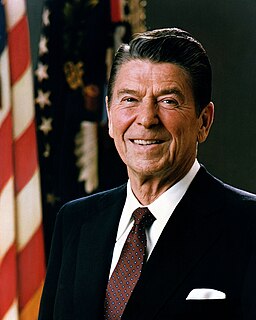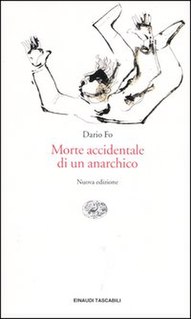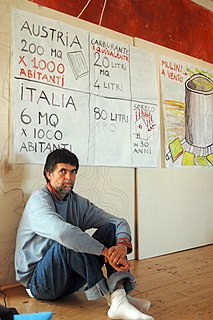| Elizabeth: Almost by Chance a Woman | |
|---|---|
| Written by | Dario Fo |
| Original language | Italian |
Elizabeth: Almost by Chance a Woman (Italian title: Quasi per caso una donna: Elisabetta) [1] is a play by Dario Fo written in 1984. Franca Rame plays Elizabeth I of England, while Fo plays her transvestite cosmetic adviser. [1]

Italian is a Romance language of the Indo-European language family. Italian, together with Sardinian, is by most measures the closest language to Vulgar Latin of the Romance languages. Italian is an official language in Italy, Switzerland, San Marino and Vatican City. It has an official minority status in western Istria. It formerly had official status in Albania, Malta, Monaco, Montenegro (Kotor) and Greece, and is generally understood in Corsica and Savoie. It also used to be an official language in the former Italian East Africa and Italian North Africa, where it plays a significant role in various sectors. Italian is also spoken by large expatriate communities in the Americas and Australia. In spite of not existing any Italian community in their respective national territories and of not being spoken at any level, Italian is included de jure, but not de facto, between the recognized minority languages of Bosnia-Herzegovina and Romania. Many speakers of Italian are native bilinguals of both standardized Italian and other regional languages.

A play is a form of literature written by a playwright, usually consisting of dialogue or singing between characters, intended for theatrical performance rather than just reading. Plays are performed at a variety of levels, from Broadway, Off-Broadway, regional theater, to Community theatre, as well as university or school productions. There are rare dramatists, notably George Bernard Shaw, who have had little preference as to whether their plays were performed or read. The term "play" can refer to both the written texts of playwrights and to their complete theatrical performance.

Dario Fo was an Italian actor, playwright, comedian, singer, theatre director, stage designer, songwriter, painter, political campaigner for the Italian left wing and the recipient of the 1997 Nobel Prize in Literature. In his time he was "arguably the most widely performed contemporary playwright in world theatre". Much of his dramatic work depends on improvisation and comprises the recovery of "illegitimate" forms of theatre, such as those performed by giullari and, more famously, the ancient Italian style of commedia dell'arte.














